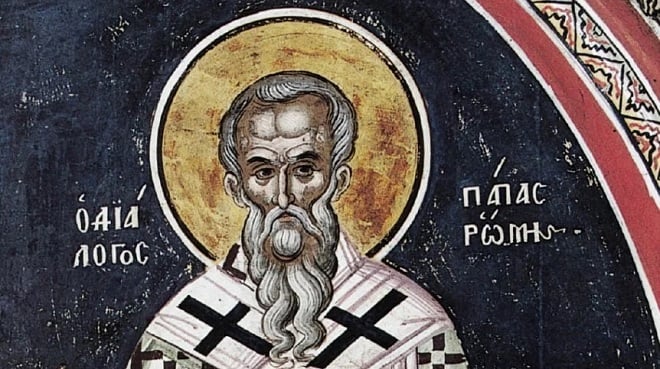Saint Gregory Dialogus, Pope of Rome (12 March)


Saint Gregory Dialogus, Pope of Rome, was born in Rome around the year 540. His grandfather was Pope Felix, and his mother Sylvia (November 4) and aunts Tarsilla and Emiliana were also numbered among the saints by the Roman Church. Having received a most excellent secular education, he attained high government positions.
Leading a God-pleasing life, he yearned for monasticism with all his soul. After the death of his father, Saint Gregory used his inheritance to establish six monasteries. At Rome he founded a monastery dedicated to the holy Apostle Andrew the First-Called, where he received monastic tonsure. Later, on a commission of Pope Pelagius II, Saint Gregory lived for a while in Constantinople. There he wrote his Commentary on the Book of Job.
After the death of Pope Pelagius, Saint Gregory was chosen to the Roman See. For seven months he would not consent to accept this service, considering himself unworthy. He finally accepted consecration only after the persistent entreaties of the clergy and flock.
Wisely leading the Church, Saint Gregory worked tirelessly in propagating the Word of God. Saint Gregory compiled the Liturgy of the Presanctified Gifts in the Latin language, which before him was known only in the verbal tradition. Affirmed by the Sixth Ecumenical Council, this liturgical service was accepted by all the Orthodox Church.
He zealously struggled against the Donatist heresy; he also converted the inhabitants of Brittany, pagans and Goths, who had been adhering to the Arian heresy, to the True Faith.
Saint Gregory has left behind numerous written works. After the appearance of his book, DIALOGUES CONCERNING THE LIFE AND MIRACLES OF THE ITALIAN FATHERS (DIALOGI DE VITA ET MIRACULIS PATRUM ITALIORUM), the saint was called “Dialogus.” His PASTORAL RULE (or LIBER REGULAE PASTORALIS) was well-known. In this work, Saint Gregory describes the model of the true pastor. His letters (848), dealing with moral guidance, have also survived.
Saint Gregory headed the Church for thirteen years, ministering to all the needs of his flock. He was characterized by an extraordinary love of poverty, for which he was granted a vision of the Lord Himself.
Pope Saint Gregory the Great, as he is known, died in the year 604, and his relics rest in the cathedral of the holy Apostle Peter in the Vatican.
Saint Gregory was born in Rome to noble and wealthy parents about the year 540. While the Saint was still young, his father died. However, his mother, Sylvia, saw to it that her child received a good education in both secular and spiritual learning. He became Prefect of Rome and sought to please God even while in the world; later, he took up the monastic life; afterwards he was appointed Archdeacon of Rome, then, in 579, apocrisiarius (representative or Papal legate) to Constantinople, where he lived for nearly seven years. He returned to Rome in 585 and was elected Pope in 590.
He is renowned especially for his writings and great almsgiving, and also because, on his initiative, missionary work began among the Anglo-Saxon people. It is also from him that Gregorian Chant takes its name; the chanting he had heard at Constantinople had deeply impressed him, and he imported many elements of it into the ecclesiastical chant of Rome. He served as Bishop of that city from 590 to 604.
He was the son of Senator Gordianus and afterward a senator himself and mayor of the city of Rome. As soon as his father died, Gregory surrendered himself to the spiritual life. From his wealth he built six monasteries in Sicily, and built a seventh in the city of Rome in honor of St. Andrew the Apostle, where he was tonsured a monk. Sylvia, his mother, entered a convent and was tonsured a nun. After the death of Pope Pelagius II, Gregory was chosen pope.
He fled from this honor and authority, hiding himself in the mountains and ravines. Nevertheless, the Lord revealed him to those who were seeking him in the following manner: a fiery column arose from earth to heaven at the place where Gregory hid himself. He was exceptionally charitable. All of his income was used for building shelters and hospices for the needy. Often he invited less fortunate men and served them at the table. He spent his time writing beneficial books. He is also called the Dialogist because he wrote a book called The Dialogues, in which he extolled the miracles of the Italian saints. He also composed the Liturgy of the Presanctified Gifts, which is celebrated on Wednesdays and Fridays of Great Lent. His Archdeacon Peter saw a dove flying above Gregory’s head as he was seated writing. He presented himself to the Lord in the year 604 A.D.
Apolytikion of Gregory Dialogos, Bishop of Rome
Fourth Tone
A model of faith and the image of gentleness, the example of your life has shown you forth to your sheep-fold to be a master of temperance. You obtained thus through being lowly, gifts from on high, and riches through poverty. Gregory, our father and priest of priests, intercede with Christ our God that He may save our souls.
Kontakion of Gregory Dialogos, Bishop of Rome
Plagal of the Fourth Tone
To thee, who art the Church’s tuneful harp inspired of God, thou tongue of wisdom who wast verily possessed of God, unto thee, as it is meet, we now offer praises; for thou truly hadst the zeal of the Apostles’ choir and didst follow in their footsteps as their worthy heir; and to thee we say: Rejoice, divine Father Gregory.
Source: oca.org / goarch.org / westserbdio.org




